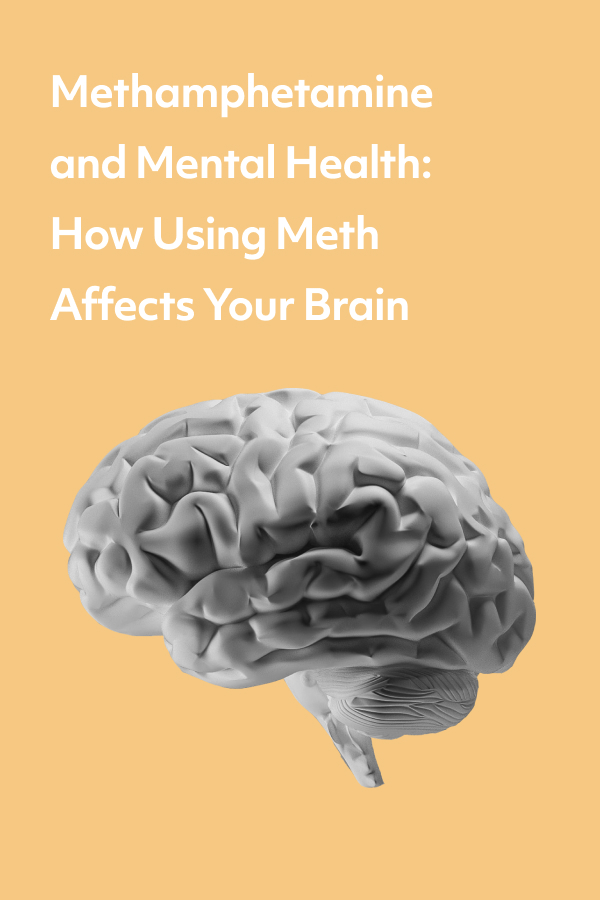Regardless of how you use methamphetamine or what kind of relationship you have with it, it’s important to recognize some of the ways using it can affect mental health.
The first time I tried methamphetamine, I was 15 years old.
I wasn’t really into uppers, but I ended up at a house with several adult men who were using crystal meth, an illicitly manufactured form of methamphetamine. When I declined the pipe they offered me, they began accusing me of being a narc and pressured me to take a hit. It was like something out of a bad movie. I don’t really remember how that first use went, but I do remember that I couldn’t sleep that night, and that by the next day I was back at the house begging for more because the crash was so terrible. All I wanted was to feel better.
I ended up addicted to meth for two years, until I quit for good at age 17. Those years were marked by paranoia, insomnia, obsessive fixations, and intermittent bursts of temporary psychosis. On top of that, I ended up dating one of the older men who supplied that first hit. He was severely addicted to methamphetamine and regularly experienced violent rage—which he unleashed upon me—when he used.
Opening my mind about others’ experiences with meth
My experience with methamphetamine was so negative that, for years, I considered methamphetamine a terrible and evil drug. I refused to associate with people who used it. It wouldn’t be until I became involved with drug-user-led harm reduction movements that I learned meth is not the same for everyone. I’d had so much difficulty stopping partly because the comedown exacerbated my pre-existing depression and my ex-boyfriend’s abusive tendencies were amplified by the stimulant. But I learned that some people are better able to moderate their use, dosage, and moods and have a more stable experience with the drug. People with Attention Deficit Hyperactivity Disorder (ADHD), for example, anecdotally report that microdosing with methamphetamine can help manage some of their symptoms. This makes sense considering that amphetamine and pharmaceutical-grade methamphetamine can be prescribed for the same condition (although it is safer to seek treatment from a clinician than to try to navigate self-medicating).
I’ve learned that no substance is completely good or completely bad for an entire population. Some people are able to successfully utilize harm reduction strategies in order to take methamphetamine without significant consequences, while others (like me) have terrible experiences with the substance. Regardless of how you use meth or what kind of relationship you have with it, it’s important to recognize some of the potential mental health impacts associated with chaotic use in order to avoid or mitigate these harms.
Impact on mood
Methamphetamine is a powerful stimulant that causes increased energy, mood elevation, and euphoria. When used in high amounts or for prolonged periods, it can also lead to agitation, paranoia, and insomnia. When used chaotically, especially when addiction develops, methamphetamine can also have a significant impact on mood.
Methamphetamine is longer acting than other popular stimulant drugs like crack cocaine. It can be snorted, smoked, eaten, and injected. While each form of use has a different duration of effect, most people who use methamphetamine find they have a difficult time sleeping the night after they use. Chronic insomnia comes with a host of issues, including mood swings, anxiety, depression, and even hallucinations. Taking breaks between use to allow space to sleep can help mitigate some of these uncomfortable side effects.
Meth acts on the dopamine and serotonin neurotransmitters, releasing high levels of these neurochemicals and creating intense feelings of pleasure. But continued overproduction of these neurochemicals can lead to depletion, which can cause depression, anxiety, and overall difficulty feeling pleasure. People who attempt to stop using methamphetamine after prolonged, chaotic use often experience these symptoms in the days and weeks after their last use.
Psychosis
People who use methamphetamine, especially in high doses and over prolonged periods, sometimes experience changes in thinking that can include psychosis. This can include paranoid beliefs, like that the police are coming, that one’s friends are not who they say they are, or that bugs are crawling under one’s skin. Sometimes, these beliefs can escalate into severe, detailed delusions and visual, audial, and/or tactile hallucinations: seeing, hearing, and feeling things that are not really there.
For most people, methamphetamine psychosis is temporary and will go away once the drug is out of the person’s system and they have gotten some sleep. But for some people with underlying mental health conditions like schizophrenia or bipolar disorder, the stimulant can trigger a prolonged break from reality that, in rare cases, can last years. People with known histories of psychosis or who are diagnosed with conditions that can result in psychosis should be especially careful when using methamphetamine.
It is impossible to predict what kind of experience you may have if you use meth. That’s why it is important to be aware of the impact it may have on your mental state, from the common side effects to the rarer ones. If you have bad effects, or if you want to stop using methamphetamine and have trouble doing so, new treatment options are becoming available.









